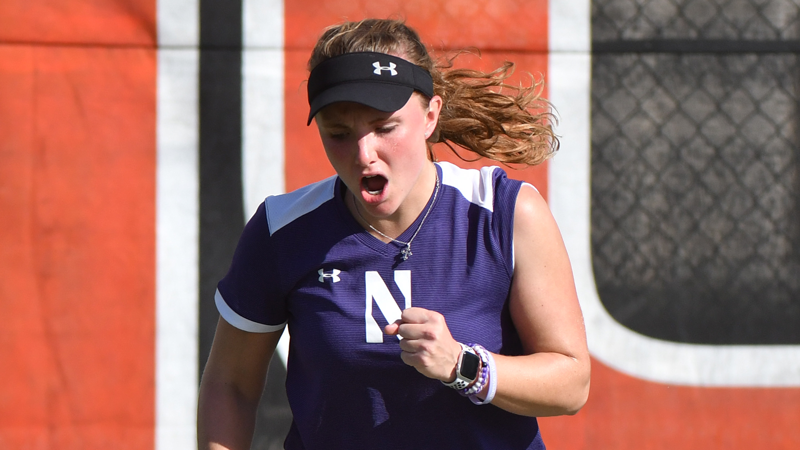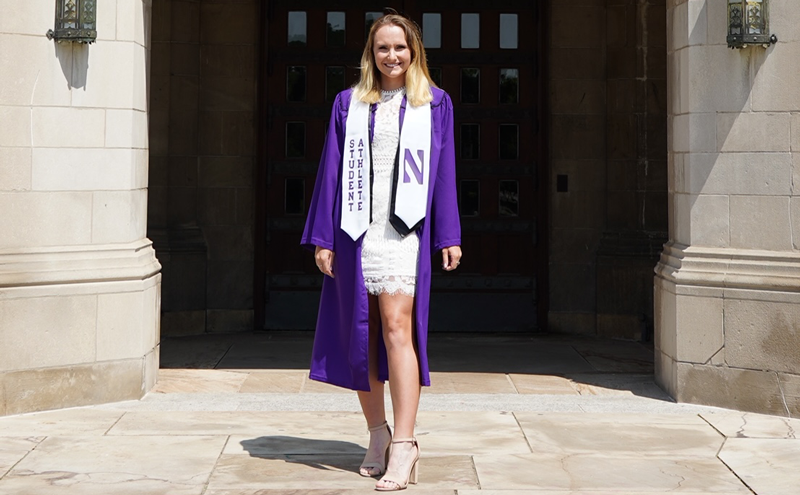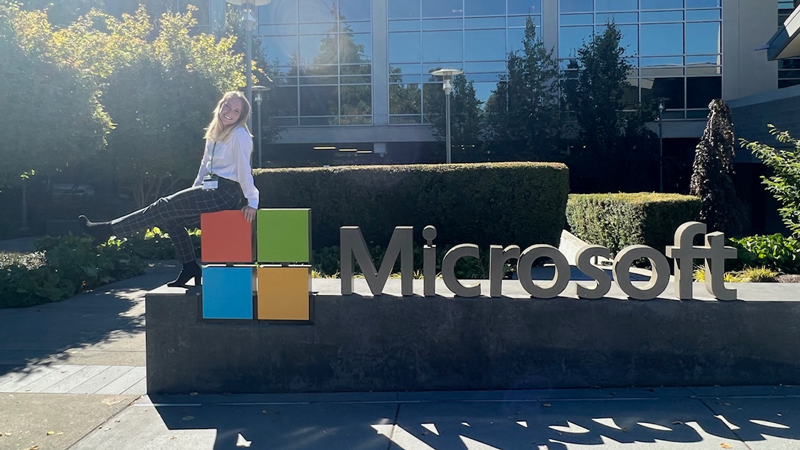Serving Up Success
Vanessa Streng (WCAS ’22), a Farley alum and former Northwestern student-athlete, leverages lessons from entrepreneurship and tennis in her role at Microsoft.

Entrepreneurship and tennis might seem worlds apart, but for Vanessa Streng (WCAS ‘22), the lessons from the sport and the Farley classroom are tightly linked, shaping her into who she is today.
As a student-athlete on Northwestern’s women’s tennis team, Streng balanced the rigorous demands of sports and studies, majoring in sociology and communications, with a minor in entrepreneurship from the Farley Center for Entrepreneurship and Innovation and a certificate in integrated marketing.
Now, as a data and AI specialist at Microsoft, Streng leverages the multifaceted experiences she gained at Northwestern. The discipline from her athletic training and the strategic thinking from her entrepreneurship studies converge in her current role, helping her stay resilient and flexible.
Below, Streng shares how her passion for tennis and entrepreneurship shaped her path, the impact of her education at the Farley Center, and the lessons she learned along the way.
What motivated you to study entrepreneurship?
The reason I went to Northwestern was first and foremost because of tennis. I also knew I wanted to work in business after college. I pieced together a sales and business education by studying sociology, communications, entrepreneurship, and marketing.
My dad is also an entrepreneur. He immigrated from the Netherlands and started a flower wholesale company. My mom worked for him, and the roof over our heads was because of entrepreneurship. I liked the idea that entrepreneurship is a perfect balance of learning how to grow personally, sell an idea (or yourself), and communicate with people, and that there’s no one “right” answer. You can do anything with it; it opens a realm of possibilities.
What was it like taking classes at the Farley Center?
The Farley professors cared about students well beyond the classroom. They all had a bigger vision for us than just getting a good grade. They put into perspective that the lessons we learned in class were preparing us for life and work after school, and it helped us feel more receptive to learning. It made learning feel more approachable knowing that my professors were there to help me grow as a person. It felt more like a community that way.

How did being a student-athlete influence your academic and personal life at Northwestern?
Being a student athlete taught me what I’m capable of physically and mentally. There were times when I did homework on a plane, flying overnight from Seattle to make it to a midterm in Evanston. My daily schedule was intense: lifting weights, attending class, practicing, grabbing a quick lunch, having a private lesson, attending another class, and then doing homework — all on repeat. Having that kind of schedule showed me that I can do it, and if I can’t do it, how to ask for help or reprioritize.
What skills did you gain at the Farley Center, and how do they apply to your role at Microsoft?
In ENREP 331: Entrepreneurial Sales and Marketing, I worked in a team to brainstorm a medical device idea and then pitch it to Harvard and UCLA professors. It made us all uncomfortable because it was new, but we quickly figured out how to persuade someone to talk to us and explain the benefits they’d get and the benefits we’d get. I use this skill in my sales work as a data and AI specialist at Microsoft. I talk with government customers about how Microsoft’s analytics or data storage solutions can help them.

What does entrepreneurial thinking mean to you?
Entrepreneurial thinking is about knowing your goal. As someone who works as a specialist, maybe it’s that I have customer projects. As a tennis player, maybe it’s that I want to win this tournament. Knowing your goal helps you put focus on what’s needed to get there.
It’s also about being flexible. In life, things don’t go according to plan. You have to rely on so many different muscles in order to adapt. You have to have confidence in yourself and have grace with others. Just like in tennis, which is a predominantly solo sport, there’s no hiding. You can’t be subbed out. It’s all you out there.
What message would you like to share with current Farley Center students?
Be genuine with yourself and to others. Whether that’s saying “I don’t know” to a question, asking someone for help, or asking someone if they want help, being genuine gives you a really strong sense of who you are, what your values are, and where you’d like to be. People gravitate toward people who want to help and be helped. You don’t have to be perfect. Be open, genuine, and transparent, and it’ll go a long way in life and in your career.
